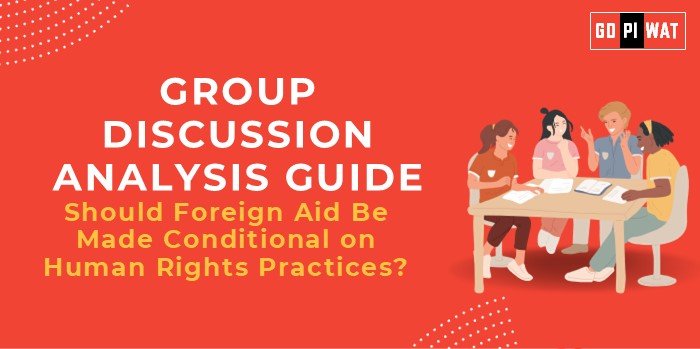📋 Group Discussion Analysis Guide: Should Foreign Aid Be Made Conditional on Human Rights Practices?
🌐 Introduction to the Topic
- Opening Context: Foreign aid has been a cornerstone of international relations, promoting development, humanitarian support, and stability worldwide. However, debates about its conditionality on human rights practices have raised ethical and practical questions.
- Topic Background: Linking foreign aid to human rights emerged prominently during the Cold War and gained momentum with international organizations advocating for global accountability. While some argue this approach ensures ethical aid distribution, others caution against undermining sovereignty or penalizing vulnerable populations.
📊 Quick Facts and Key Statistics
🌍 Global Aid Value: $204 billion (2023) – Demonstrates the scale of international development assistance.
⚖️ Human Rights Violations: Over 50% of nations receiving aid are flagged for human rights abuses (Freedom House, 2023).
🌐 Top Donors: USA, EU, and Japan contribute over 60% of global foreign aid (OECD, 2023).
📈 Policy Impact: 25+ countries improved human rights post conditional aid policies (UNDP, 2023).
⚖️ Human Rights Violations: Over 50% of nations receiving aid are flagged for human rights abuses (Freedom House, 2023).
🌐 Top Donors: USA, EU, and Japan contribute over 60% of global foreign aid (OECD, 2023).
📈 Policy Impact: 25+ countries improved human rights post conditional aid policies (UNDP, 2023).
👥 Stakeholders and Their Roles
- 🏛️ Donor Governments: Ensure funds support development while maintaining accountability.
- 🌍 Recipient Governments: Balance sovereignty with compliance to conditional terms.
- 🌐 International Organizations (e.g., UN): Mediate and monitor aid’s impact on human rights.
- 🌱 Civil Society Groups: Advocate for equitable aid distribution and human rights enforcement.
🏆 Achievements and Challenges
✨ Achievements
- ⚖️ Promoting Accountability: Countries like South Africa implemented reforms tied to aid conditions.
- 📚 Targeted Impact: Conditional aid has supported marginalized groups (e.g., education for girls in Afghanistan).
- 🌍 International Norm Setting: Encourages adherence to global human rights conventions.
⚠️ Challenges
- 🌐 Sovereignty Issues: Some nations perceive conditional aid as a tool for political interference.
- 📉 Impact on Vulnerable Populations: Withholding aid can exacerbate poverty and instability.
- 📊 Global Comparisons: While successful in Rwanda, such policies failed to deter abuses in Sudan.
📢 Structured Arguments for Discussion
- ✅ Supporting Stance: “Making foreign aid conditional on human rights fosters accountability and encourages nations to align with international norms.”
- ❌ Opposing Stance: “Conditional aid risks exacerbating inequality and punishes vulnerable populations for government failures.”
- ⚖️ Balanced Perspective: “Conditional aid can drive progress when paired with context-sensitive policies and robust monitoring mechanisms.”
🧠 Effective Discussion Approaches
- 🎯 Opening Approaches:
- “The global aid landscape is worth over $200 billion, but its effectiveness often hinges on accountability mechanisms like human rights conditions.”
- “Rwanda’s success with conditional aid provides a strong case for its potential, contrasting with challenges in other regions.”
- 🤝 Counter-Argument Handling:
- “While conditional aid may seem intrusive, history shows its potential to catalyze long-term reforms, as seen in post-apartheid South Africa.”
📊 Strategic Analysis of Strengths and Weaknesses
- Strengths: Promotes accountability, aligns with ethical governance, supports marginalized groups.
- Weaknesses: Risk of political misuse, reduced aid flow, challenges to sovereignty.
- Opportunities: Partnerships for tailored aid, leveraging technology for monitoring.
- Threats: Geopolitical tensions, misinterpretation of motives.
🎓 Connecting with B-School Applications
- 💼 Real-World Applications: Students can explore case studies on governance reforms, CSR in global aid, or impact assessment in development projects.
- 📚 Sample Interview Questions:
- “Can conditional aid improve governance without undermining sovereignty?”
- “How does foreign aid influence geopolitical stability?”
- 💡 Insights for Students: Understand stakeholder dynamics, link conditional aid to ethical leadership in business.


